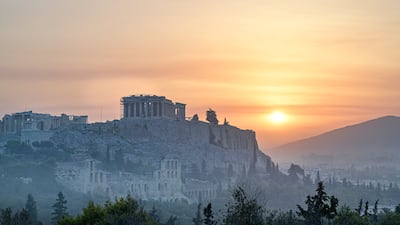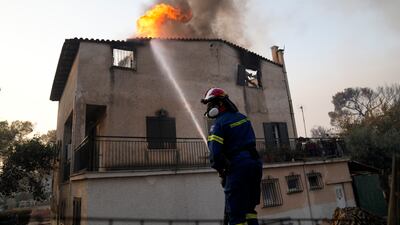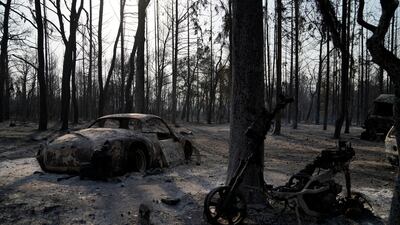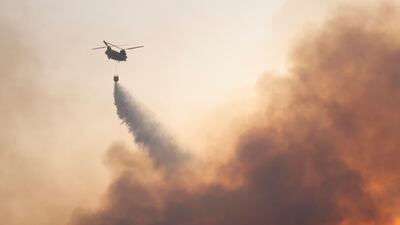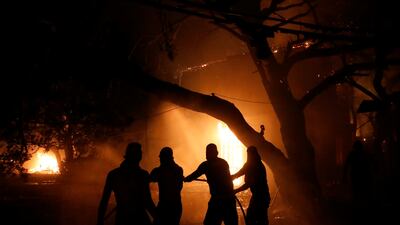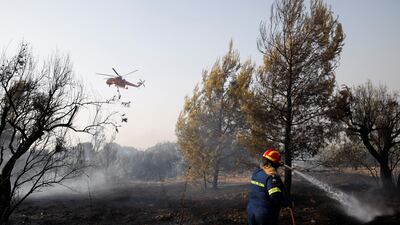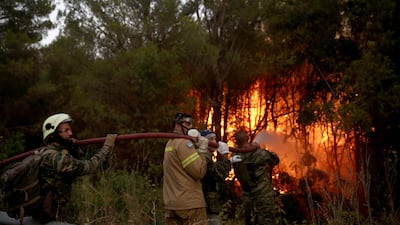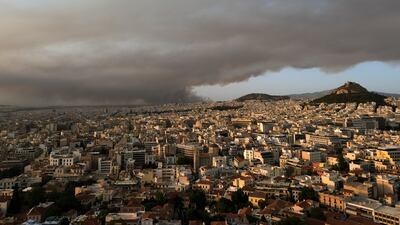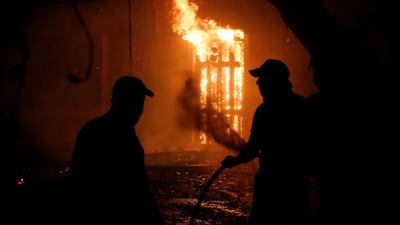The Greek island of Evia was cut in two on Sunday as bushfires raged for a sixth day.
Dozens of people were ferried from beaches in northern Evia overnight after fires burned from coast to coast, cutting off other means of escape.
Homes were destroyed and thousands of hectares reduced to ashes on the island, whose thick forests and rugged landscape make it popular with campers.
The Greek emergency services are being backed by reinforcements from at least 11 countries.
More than 250 Greek firefighters were joined by 100 each from Ukraine and Romania.
An amphibious Beriev-200 plane from Russia offered air support. Germany sent dozens of vehicles, Egypt offered two helicopters and French pilots were among those taking off to tackle the fires.
Visiting the airport where they took off on Saturday, Greek Prime Minister Kyriakos Mitsotakis said the forests destroyed by the fires would be restored.
“When this nightmarish summer has passed, we will turn all our attention to repairing the damage as fast as possible,” he said.

More than 1,000 people were helped off Evia, Greece’s second-largest island after Crete, on Friday.
Another 83 were rescued by ferries and coastguard vessels overnight, with towering flames cutting off roads.
A flotilla of at least 10 ships including patrol boats, fishing vessels and a ferry were on standby to take more people off the island if needed.
Firefighters worked through the night in an effort to save Istiaia, a town of 7,000 people on the island, using bulldozers to create clearings in the forest.
Some residents refused to leave the island, hoping to save their properties, but were urged to block their windows and chimneys to stop embers getting into buildings.
Columns of smoke and ash turned the sky orange as the fire continued to devour forests.
Beyond Evia, three other fires were burning in the southern Peloponnese region, while a fifth blaze north of Athens appeared to be on the wane.
Dozens of homes and businesses were burnt in the Greek capital’s northern suburbs, prompting evacuation of the area.
“Under no circumstances can we be complacent,” Deputy Civil Protection Minister Nikos Hardalias. “We are fighting a very big battle.”
Provisional shelter was given to 2,000 people who had to flee their homes.
The fires come amid Greece and Turkey’s hottest temperatures for decades and are linked to climate change by experts and officials.
Scientists say that global warming makes extreme weather events, such as the fires and last month’s floods in Germany, more frequent and intense.
The fires have killed at least two people in Greece and eight in Turkey, with dozens more taken to hospital.
Turkish authorities say more than 200 fires have been brought under control since July 28 after sweeping through the country’s southern coast.
Authorities were urged by environmental groups to protect the forests of Turkey’s Sandras Mountain from nearby fires.
While weekend rain has brought some respite to Turkey, Greece continued to suffer as temperatures soared.
These have reached 45°C in what was described as Greece’s longest and most intense heatwave for three decades.
One fire official in Greece told local media that the fires were so intense that water from fire hoses was evaporating before reaching its target.
Fires were destroying houses in the villages of Ellinika, Vasilika and Psaropouli.
Major fires have also burned across Russia in recent weeks, with a dozen villages in Siberia evacuated on Saturday.












